Star Trek: Section 31
A late-night TV escapee
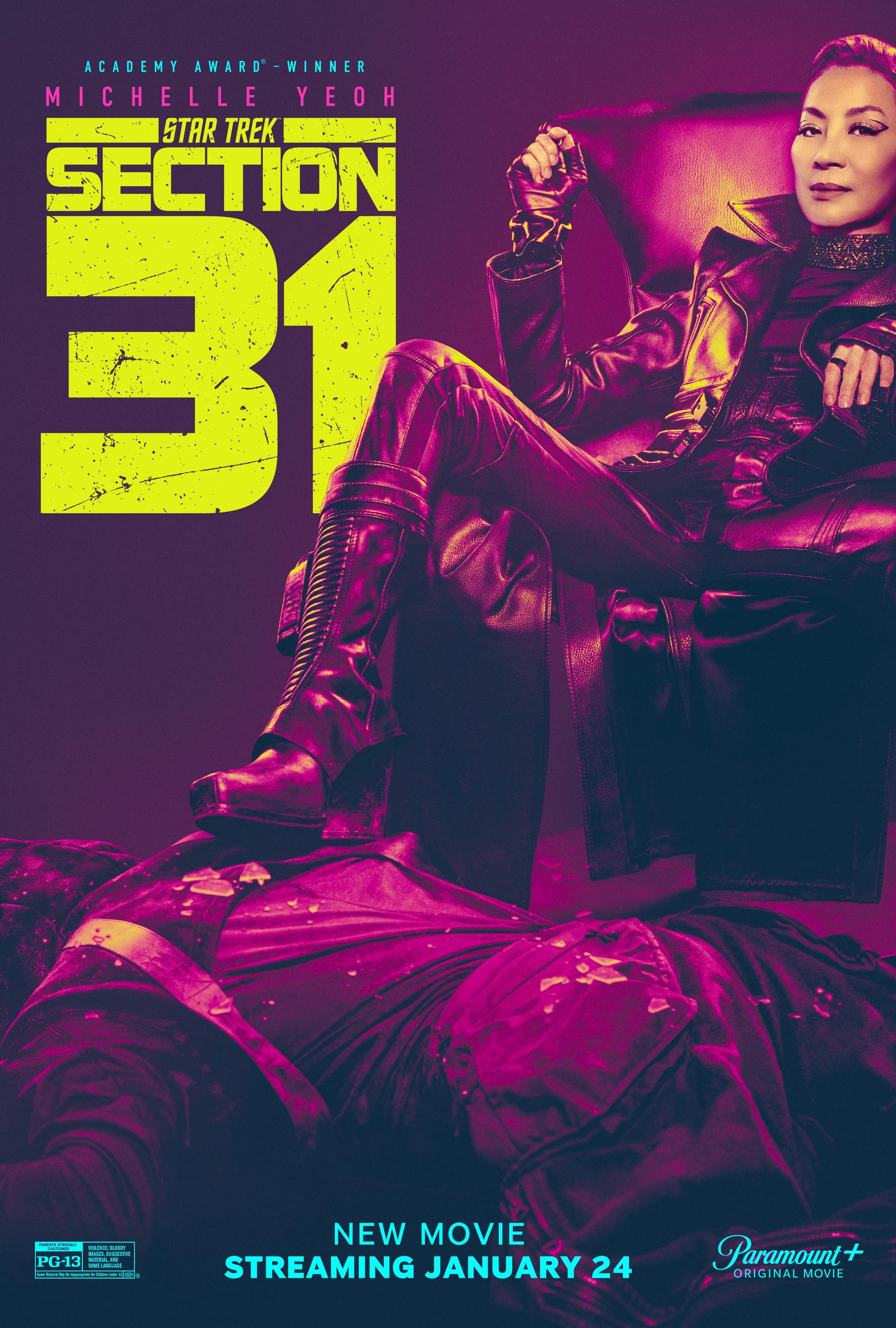
The alternate reality refugee, and former Emperor of the Terran Empire, Philippa Georgiou, is tasked with protecting the United Federation of Planets in the places where the Federation can't go, only to find that the latest threat is tied to ghosts from her own genocidal past.
Star Trek: Section 31 is a spin-off movie from the tv show Star Trek: Discovery. An interesting in conception, but in the end, terrible in execution, and now seemingly all but memory-holed, Star Trek show, Discovery was originally meant as a kind of revisionist reboot prequel of sorts, set in a time before the original show. But after struggling to find its place in the greater Star Trek universe, despite having a good cast of characters, it ended up finally petering out in a very loosely connected (and therefore more easily wiped out of the official canon) Star Wars meets Farscape-esque far-flung future.
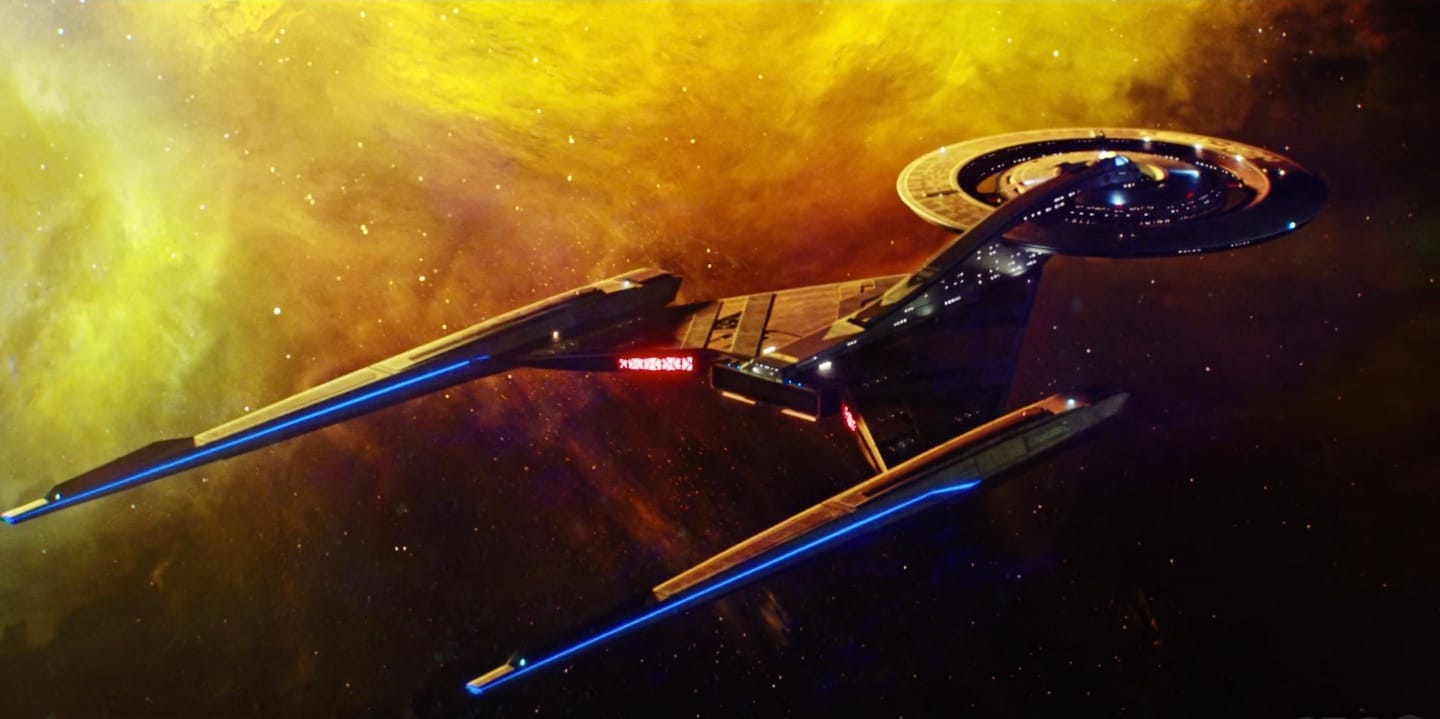
Truthfully, when it comes to geek stuff, I’m not all that much of a huge Star Trek nerd. I was always more of a Star WARS kid, then I was a Star TREK kid, but still, I’ve probably seen every episode of all the shows.
This is mostly due to me having had the kinds of jobs that often meant I got home from work around bar close or so each night, while also being the kind of jobs that didn’t come close to paying me enough to be able to afford cable, so the late night syndication on broadcast channels was my friend. That, and a bong hit or two. So yeah, while not a huge fan, I’ve enjoyed Star Trek over the years, especially Deep Space Nine (but mostly after Worf joined the show). I was also a huge fan of the original theme song to the show Enterprise, and I'm sure much like all of you, have always dreamed of leading an impromptu sing-along of it at a Star Trek convention. More recently, I've really been into the newer shows, like Lower Decks and Strange New Worlds, obviously, and also The Orville too, which was basically Next Generation fanfic. So yeah, okay, while there's a nuance there that is really only important to nerds-in-the-know, it's fair to say that, at least as far as the world of the Normies is concerned, I'm a Star Trek fan. I say all this to explain that I was really looking forward to Discovery.
I really wanted to like it.
Set in a time about ten years before the original series, Discovery centered on Commander Michael Burnham, Spock’s human adopted sister, as she is assigned to the USS Discovery, the only ship in the Federation with a special “Spore Drive” that allows them to basically teleport across the galaxy. Despised, disgraced, and court-martialed after her actions accidentally set off the Federation/Klingon War—Whoopsie!—she is on her last chance assignment. Lucky for her, due to the power of friendship and understanding, Burnham soon finds her place amongst the crew of the Discovery, and goes on to reliably save the galaxy every season.
And as I said, the show had a great cast, including Sonequa Martin-Green, Doug Jones, Anthony Rapp, Jason Issacs, Tig Notaro, Anson Mount, and Michelle Yeoh, amongst others, and some cool–albeit not very “Star Trek” feeling–designs. Plus, each season always seemed to start from a really interesting place, so each new season, I was always intrigued.
But whether those cool ideas involved revisiting the Mirror Universe, where the “evil goatee” trope had it’s origin, or fighting a war against the Klingons, even if their heads were weird, or re-introducing Captain Pike, captain of the Enterprise before Kirk (which then led to Strange New Worlds, a flat out great show), or when the ship and the entire crew were rocketed forward in time to a far flung post-Federation dystopian future, every single season…

Discovery very clearly was trying to be more emotionally driven in general in its approach to stories, and to focus on the interpersonal aspects of the crew, while also trying to resolve the show's conflicts more often with conversations than with phasers and photon torpedoes, which at the very least, is laudable. But in the end, it just ended up feeling way too try-hard. At times, it felt more like a parody of bad Star Trek fanfic, the kind of conflict-avoidant snooze-fest where the author is just too hesitant to put their beloved characters in danger, so instead they like, work in a coffee shop or something, and there are no real tense situations to speak of, but should there be a misunderstanding of some kind, perhaps a delivery is wrong, or maybe an order is entered incorrectly, something that upsets the prolonged stream of banter and uwu-cuteness, it is all solved by a long, emotionally-open, intently earnest, and very heartfelt explanation, all of which is delievered without anyone raising their voice, and then a big teary hug.
Okay fine, that’s an over-simplification of the show, sure... kind of... my point is, Discovery was often hindered from telling complete and satisfying stories by its obvious prioritizing of its unearned and overly-earnest sincerity.
And the crying. There was just way too much crying.
In the end, the sad truth is... Discovery was a bad show. Poorly conceived and executed even worse, it was a mistake that went on for too long, one that couldn’t correct itself, no matter how many times it tried, because its issues simply ran too deep, and now it is one that seems like it is being quietly (deservedly) forgotten. I couldn't even bring myself to finish out the show, and never watched the last 3 or 4 episodes. That kind of sucks, because like I said, I really did want it to be good, and I hate abandoning things like that so late in the game (See: Star Wars: The Rise of Skywalker). Especially because I love a good reboot, or an update, or a sly alt-universe version of an established universe. That's fertile narrative ground, if you ask me. Take some familiar elements, change things up, and try something new. Show me what you got. I’m interested.
I mean, the idea of a crew of Federation officers getting launched into a far-flung future, nearly a thousand years ahead, hundreds of years after the collapse and dissolution of the United Federation of Planets, finding themselves now adrift in a fractured and dangerous universe, one that is at once so familiar, and yet also filled now with so many… strange new worlds? That sounds to me like a great chance to re-explore some once well-known corners of the galaxy, to seek out the new lives and civilizations of former friends and enemies, and boldly go into the places we've been before, but now, no longer know! I love that. Especially when the mission is to recreate a now lost and forgotten legacy of hope and unity, and all without any support, while running tech that's around a millenium out-of-date? That’s sounds fun to me. More than that, it sounds like Star Trek to me. Star Trek meets Flash Gordon? Sure. Star Trek meets Farscape? Yep.
That could have been great.
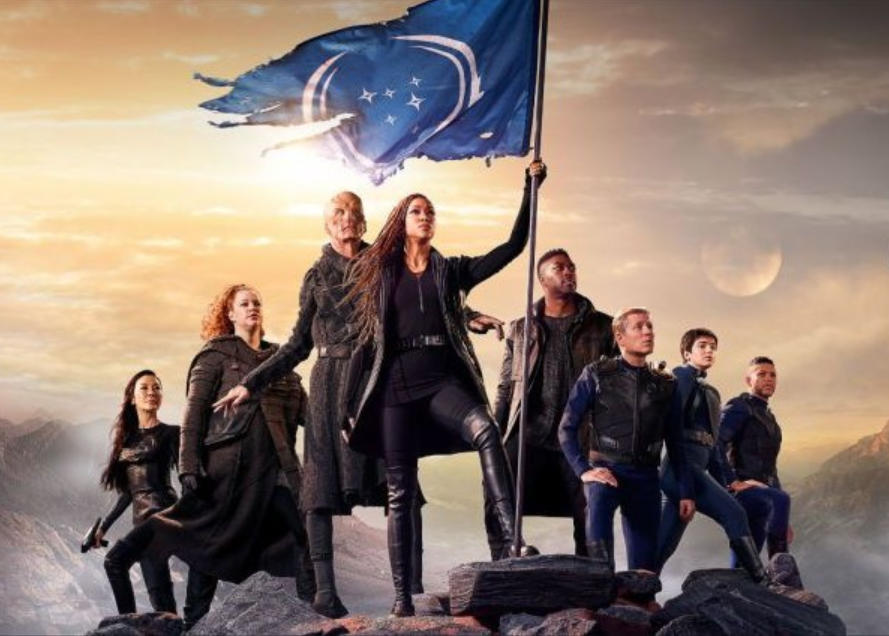
But alas…
Anyway, this is why I watched this spinoff movie, Star Trek: Section 31, because hope springs eternal. A peek into the dark corners of the normally bright Star Trek universe? An adventure following the ”dirty tricks” derring-do of a disparate group of criminals, ne’er-do-wells, and secret agents as they protect the galaxy in ways that the clean uniforms and massive starships of the Federation can’t? I love it. I want a “dirty” end of Star Trek. I want stories from the world of Star Trek about commandos, spies, revolutionaries, and pirates. Give me some swashbuckling and some war and some daring escapes in non-traditional ships. I want that. I don’t want all of Star Trek to be like that, of course, but a corner could be fun.
Unfortunately, where Star Trek: Strange New Worlds might be the best thing that Star Trek: Discovery is responsible for, Star Trek: Section 31 is by far the worst.
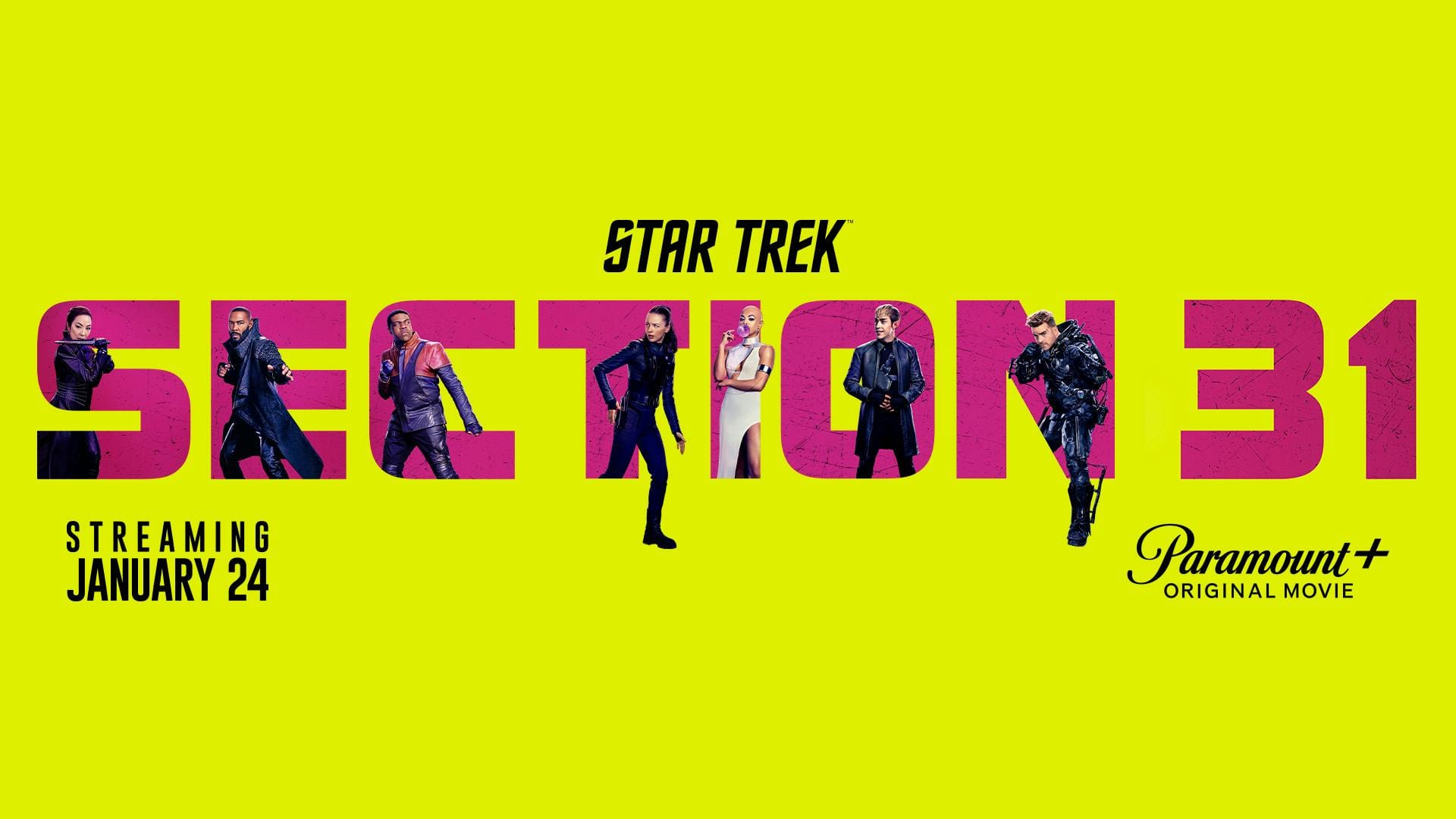
Section 31 takes place smack dab in the middle of the 70-some years between Captain Kirk’s death in the movie Star Trek: Generations, and Star Trek: The Next Generation‘s first episode, so about 40 years before the Encounter at Farpoint. This is a timeframe that is apparently known as “The Lost Era” amongst the faithful devoted.
Philippa Georgiou (played by Michelle Yeoh) was originally introduced as the captain of the USS Shenzhou, and as a mentor to Michael Burnham, but she was killed in battle during the Klingon-Federation War, making Michael responsible for her death, something the character struggled with for awhile. But being as this show is built on sci-fi magic, Philippa Georgiou later returned as an alternate version of herself from the Mirror Universe.
In the Mirror Universe, everyone has an evil, violent, and cruelly opportunistic version of themselves–basically MAGA World–and Earth is the head of the brutal Terran Empire. First introduced in season 2, episode 4 of the original series, titled “Mirror, Mirror,” the Mirror Universe is the "Evil Spock has a goatee" place. The evil version of Georgiou turned out to be her most Imperial Majesty, the Mother of the Fatherland, the Overlord of Vulcan, the Dominus of Kronos, Regina Andor, Philippa Georgiou Augustus Iaponius Centarius, Emporer of the Terran Empire. The character knocked around in Discovery for awhile, causing a little trouble and chewing a little scenery, all while smirking and evilly raising an eyebrow, before fading away, and now she’s living outside of Federation-controlled space, running your typical dive bar/space port/Casablanca cliche, the kind of down and dirty spot where the rough and tumble come to relax, and a glimpse of stocking isn’t considered shocking, because as you know… anything goes.
Enter the Federation…
Like the imperialistic efforts of the United States, the Federation is always sticking their nose in where it’s not welcome, and if they can’t do it by parking one of their massive ships over your head, they’ll do it by sending in a bunch of off-the-books killers to protect their interests. And so, we meet a Section 31 Black Ops Team. An autonomous intelligence and defense organization tasked with carrying out covert actions for the United Federation of Planets, Section 31 is the Federation’s CIA and JSOG Operators. They’re usually depicted as being about as scrupulous as the CIA was in the 70s and 80s too, justifying their actions by their end-results, and generally answering to no one.
So, on the team, there’s a time traveler from Earth’s distant past, specifically from the Eugenics War. (The Eugenics War is something that used to happen in the '90s originally, when it was the reason for Khan's existence, but due to some temporal war shenanigans, and also due to the fact that the 1990s are now 30ish years ago, it now takes place in the 2030s. Just fyi.) There’s a cyborg, who looks like the Borg meets the Mandroid from the classic 1986 sci-fi film, The Eliminators. There's a shapeshifting Chameloid, played by the always welcome Sam Richardson. There's a Deltan empath, who uses pheromones and telepathy to make people super horny for her. There's a Nanokin, a very tiny alien who sits in a very tiny space ship and uses it to drive a robot that looks like a Vulcan. And finally, there's also a Star Fleet officer, specifically Rachel Garrett, who is destined to one day be the captain of the USS Enterprise-C, and in 20-ish years or so, will get caught in a temporal rift while defending a Klingon outpost from Romulans.
At first glance, the team a nice mix of strange and obscure ideas, as well as some small ties to larger continuity, but for the most part, there isn't really interesting about them. This is made all the worse, because there’s also nothing in the story that justifies any of their specific species, traits, or abilities either. They're just a gaggle of ideas with no real application to story. Why bother making the one guy a Time Travel refugee if it doesn't have any bearing on your larger events. I realize this "movie" is really a backdoor TV pilot, but putting too many eggs in your "For Future Stories" basket instead of your "Possibly the only story we're gonna get a chance to tell" basket is just a good way to end up with a lot of spoiled eggs. So all we've got here is just a poor attempt to cast a wide and non-traditional Star Trek character net, all in order pursuit of a similar energy to the disparate, antagonistic chemistry of something like the Guardians of the Galaxy or Farscape, but like a five year old trying to dunk, it falls sadly and pathetically short.
But anyway...
Of all the gin joints, in all of space outside of Federation control in all the galaxy, the Black Ops team shows up in Georgiou’s bar/space port, because they need her help to intercept the sale of a superweapon that threatens the galaxy. Their arrival is fortuitous, because the exchange is happening right then, but their hasty sting is interrupted by a mysterious figure using random-ass technology in order to take the McMuffin right out of their hands, but that only happens after we learn that the weapon's origin can be traced back to Georgiou’s years at the head of the Terran Empire. GASP! Georgiou's chickens, they have come home to roost!
Also—GASP!—one of the team might be a mole!
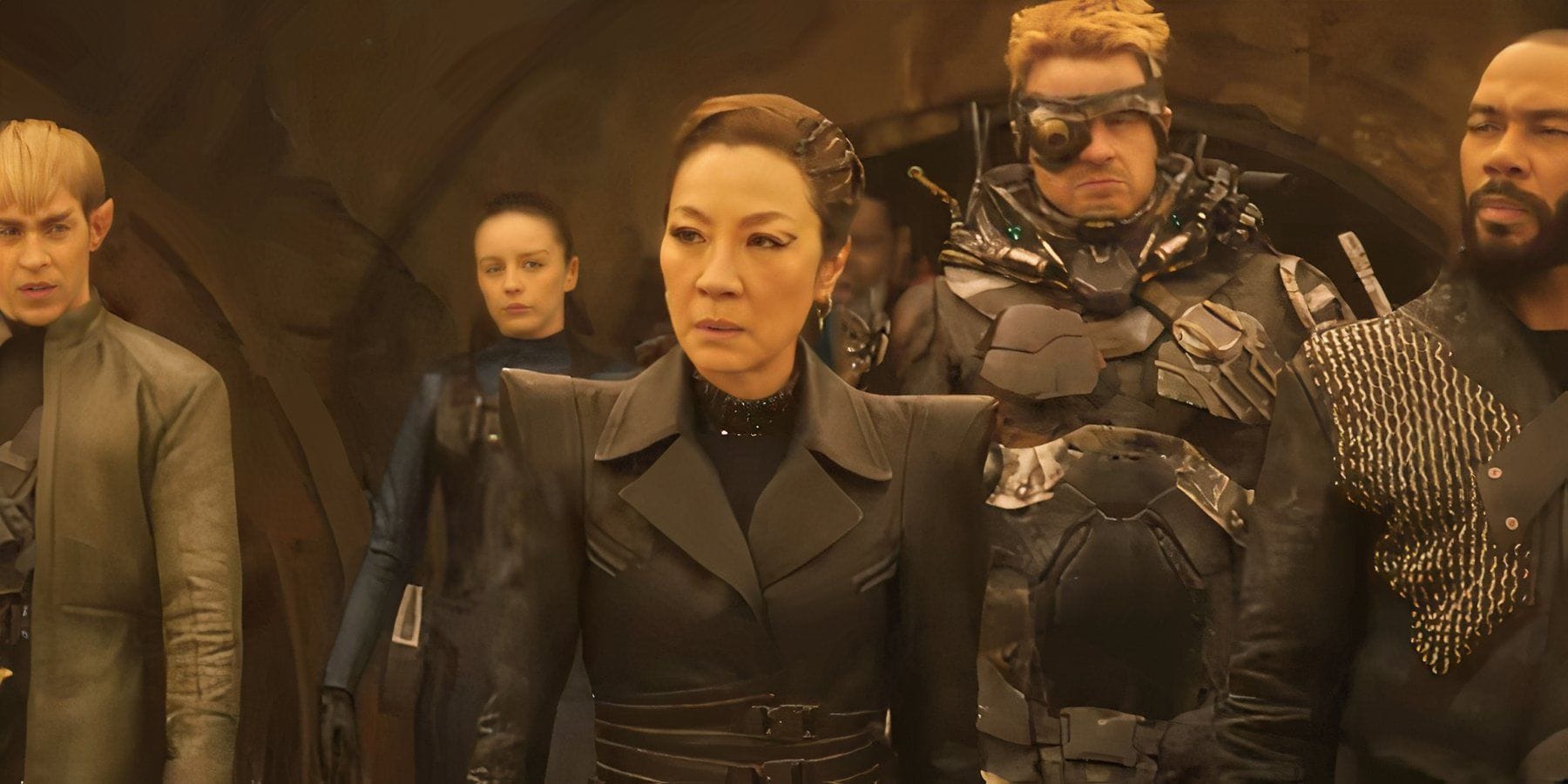
Section 31 is very paint-by-numbers, very unsurprising, and very boring. It's just... bad TV sci-fi, folks. That's it. It's just the latest attempt at 1993's Space Rangers.
It’s like there’s two warring ideas here. Someone clearly wanted to do a Star Trek spy/commando show, while someone else clearly wanted to do a Georgiou show. That they tried to do both at the same time only made things worse, as the primary story only makes the secondary one seem like a waste of time, and the secondary story generally just gets in the way of the primary one, and prevents it from being interesting and complete. Basically, everyone is stepping on everyone else’s toes the whole time, and nothing ends up working.
A back-door pilot for a subpar show (one I doubt would get any better, but we'll never know), poorly disguised as a "dirty dozen meets ocean’s eleven in space" riff, centered around a typical “get the galaxy-ending mcguffin before generic bad guys do” plot, but without any interesting set pieces or characters to speak of, Star Trek: Section 31 is weighed down with too much exposition, unearned gravitas, and a cheap looking sets and designs. Worst of all, it's just plain old dull.
Thumbs down.
